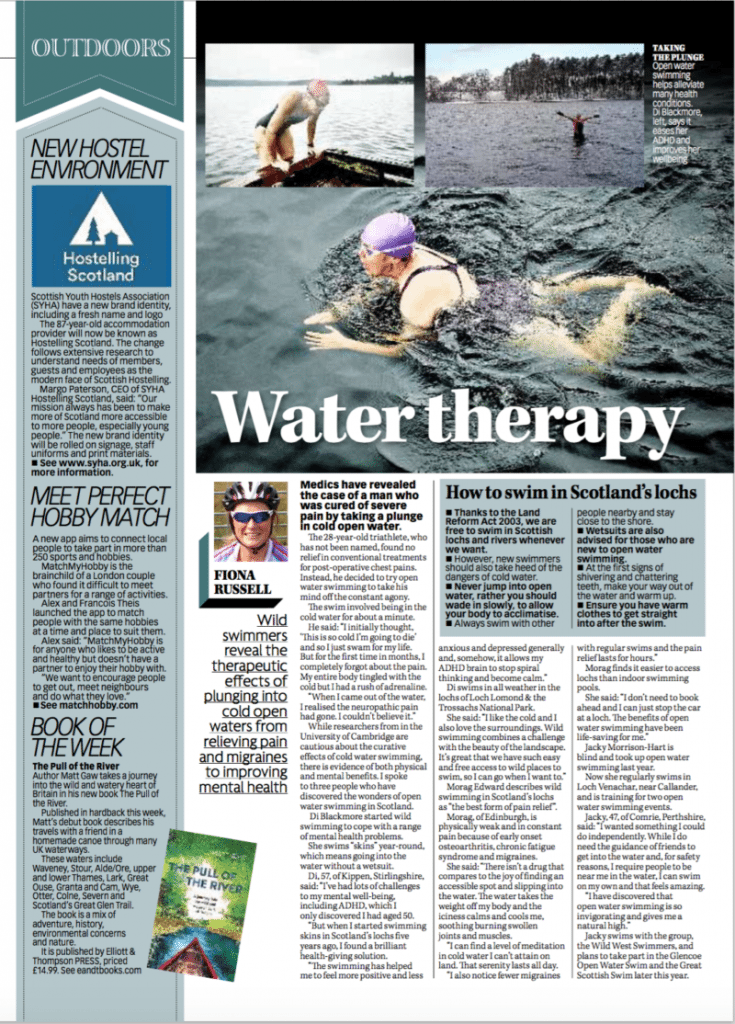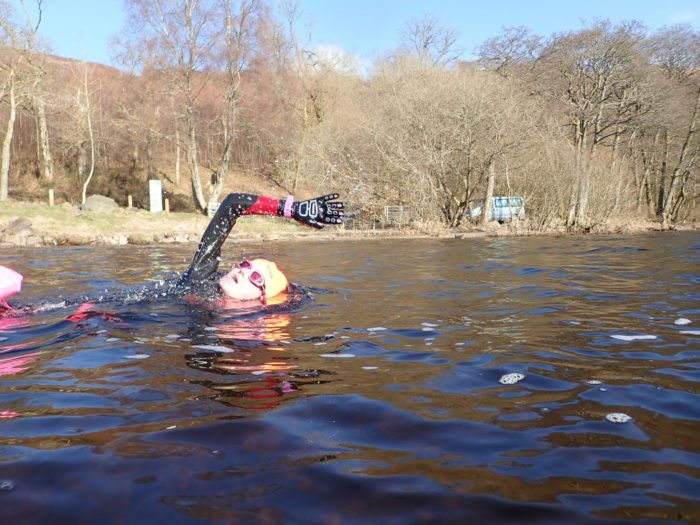Open water swimming is widely claimed as having the power to heal mental and physical ill-health. In my recent Sunday Mail outdoors column, I spoke to three people who have found great benefits to plunging into lochs, rivers and the sea year-round. Read the story below and see the pdf.
The wonders of open water swimming
Medics recently revealed the case of a man who was cured of severe pain by taking a plunge in cold open water. The 28-year-old triathlete, who has not been named, could find no relief from conventional treatments for post-operative chest pains.
Instead, he decided to try open water swimming to take his mind off the constant agony. The swim involved being in the cold water for about a minute. He is reported as saying: “I initially thought this is so cold I’m going to die and so I just swam for my life.
“But for the first time in months, I completely forgot about the pain. My entire body tingled with the cold but I had a rush of adrenaline.
“When I came out of the water, I realised the neuropathic pain had gone away. I couldn’t believe it.”
While researchers from in the University of Cambridge are being cautious about the curative effects of cold water swimming, there is evidence of others who enjoy both physical and mental benefits.
I spoke to three people who have discovered the physical benefits and mental therapy of open water swimming in Scotland.
Swimming calms my mind
Di Blackmore started wild swimming to cope with a range of mental health problems. She swims “skins” year-round, which means going into the water without a wetsuit.
Di, 57, of Kippen, Stirlingshire, said: “I have had lots of challenges to my mental well-being, including ADHD, which I only discovered I had aged 50.
“But when I started swimming skins in Scotland’s lochs five years ago I found a brilliant health-giving solution.
“The swimming has helped me to feel more positive and less anxious and depressed generally and, somehow, it allows my ADHD brain to stop spiral thinking and become calm.”
Di swims in all weather in the lochs of Loch Lomond & the Trossachs National Park. She said: “I like the cold and I also love the surroundings. Wild swimming combines a challenge with the beauty of the landscape.
“It’s great that we have such easy and free access to these wild places to swim, so I can go when I want to.”
Swimming for independence
Jacky Morrison-Hart is blind and took up open water swimming last year as a new challenge. Now she regularly swims in Loch Venachar, near Callander, and is training for two open water swimming events.
Jacky, 47, of Comrie, Perthshire, said: “I was looking for something different to do and something I could do independently.
“While I do need the guidance of friends to get into the water and, for safety reasons, I require people to be near me in the water, I can swim on my own and that feels amazing.
“I have discovered that open water swimming is so invigorating and gives me a natural high.”
Jacky swims with a group, the Wild West Swimmers, and plans to take part in the Glencoe Open Water Swim and the Great Scottish Swim later this year.
Swimming for pain relief
Morag Edward describes wild swimming in Scotland’s lochs as “the best form of pain relief”. The Edinburgh swimmer is physically weak and in constant pain because of early onset osteoarthritis, chronic fatigue syndrome and migraines.
She said: “There isn’t a drug that compares to the joy of finding an accessible spot and slipping into the water.
“The water takes the weight off my body and the iciness calms and cools me, soothing burning swollen joints and muscles. I can find a level of meditation in cold water that I can’t attain on land and that serenity lasts all day.
“I also notice fewer migraines when I’ve got regular access to swims and the pain relief lasts for hours.”
Morag finds it easier to access lochs than indoor swimming pools. She said: “I don’t need to book ahead and I can just stop the car and gain easy access to a loch. The benefits of open water swimming have been life-saving for me.”
How to swim in Scotland’s lochs
Thanks to the Land Reform Act 2003, we are free to swim in Scottish lochs and rivers whenever we want. However, new swimmers should also take heed of the dangers of cold water.
Never jump into open water, rather you should wade in slowly, to allow your body to acclimatise.
Always swim with other people nearby and stay close to the shore.
Wetsuits are also advised for those who are new to open water swimming.
At the first signs of shivering and chattering teeth, make your way out of the water and warm up.
Ensure you have warm clothes to get straight into after the swim.
If you need to, here’s further help on where to find a mental health therapist.



